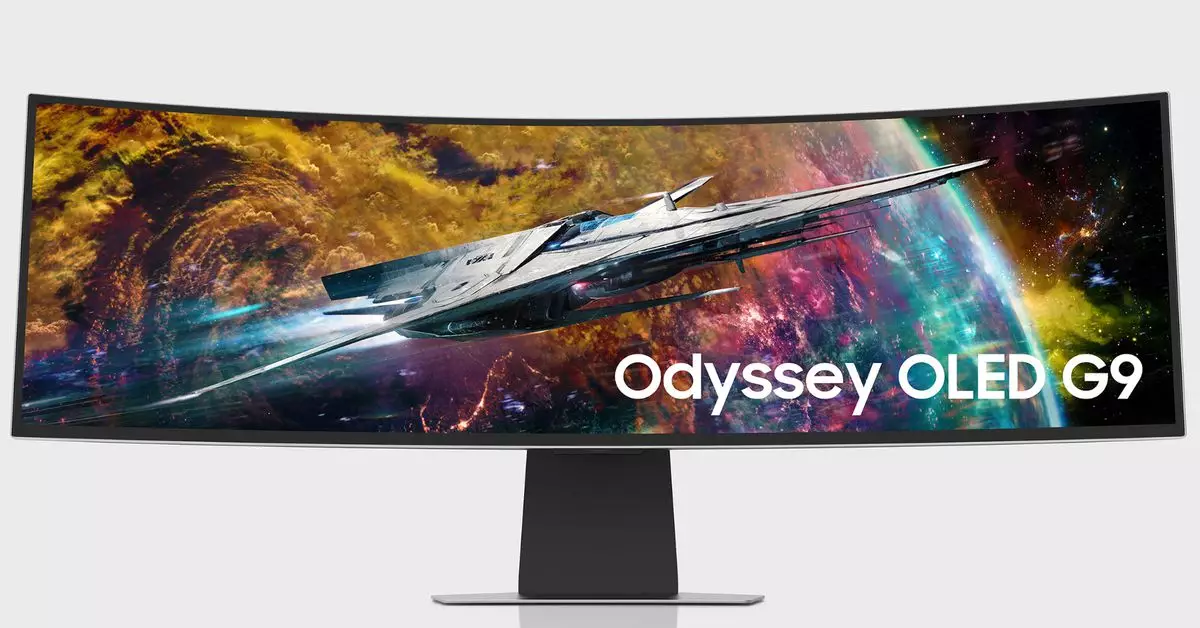The constantly evolving landscape of technology products often brings with it a whirlwind of promotional offers, compelling deals, and sometimes, questionable choices made by corporations. One such case is the ongoing saga of Samsung and its latest deal on the 49-inch Odyssey OLED G9 gaming monitor, which has sparked discussions about the company’s direction and pricing strategies. As consumers navigate through the plethora of available options, understanding the motivations behind these promotions becomes critical to making informed purchasing decisions.
In a recent move, Samsung is offering its flagship 49-inch Odyssey OLED G9 gaming monitor at a significantly reduced price of $1,099.99, which includes an impressive $700 discount. This deal includes a complimentary 24-inch Odyssey G30D monitor, a noteworthy addition that arguably enhances the overall value. However, it raises questions about Samsung’s pricing strategy and its goal of moving excess inventory. This type of promotional deal reflects a broader trend in the tech industry, wherein companies entice consumers with attractive bundles while attempting to clear out older models or create a buzz around a flagship product.
It’s essential to consider the implications of such strategies for consumers. While the allure of high-value deals can be tempting, buyers must ask themselves whether they truly need the additional monitor. The second display may not be relevant to all potential customers, especially those who prioritize quality over quantity. In this instance, evaluating one’s actual needs versus the deal being marketed could safeguard against unnecessary expenditure.
The Odyssey G95SC itself boasts remarkable specifications: a rapid 0.03ms response time and a refresh rate of up to 240Hz. These features are particularly appealing to gamers who rely heavily on competitive-speed displays. The monitor’s OLED technology further contributes to its rich visual experience, producing deep blacks and vivid colors. However, performance metrics must align with the user’s existing setup. For instance, not all gaming PCs can support the high frame rates stitched together by these ultrawide displays, which could render the investment less valuable for some. Ensuring that the hardware is compatible with the desired performance level is a crucial step before committing to a purchase.
Interestingly, the article also references additional products amidst Samsung’s offer, hinting at the broader market of technology deals. For example, the Anker 6,600mAh Qi2 power bank has dropped to $29.99, a substantial discount that makes it a tempting purchase for those invested in wireless charging technology. Highlighting products like these indicates a trend among tech companies to broaden their scope beyond flagship devices by offering functional accessories at competitive prices.
Consumer electronics often come as part of an interdependent ecosystem. In this context, acquiring the right peripherals such as power banks, headphones, or secondary displays can enhance the primary purchase experience. However, just like with the monitor deal, the key is to assess whether such additions genuinely improve functionality without leading to buyer’s remorse.
Amidst these enticing deals, a cautionary tale arises concerning tech companies and their motives. Take, for example, Samsung’s earlier flounderings, such as reallocating resources in its product designs, leading to mixed reviews from consumers regarding recent releases. This misalignment between consumer expectations and corporate direction can occasionally skew the perception of value and reliability, making it critical for consumers to maintain a skeptical view when they come across striking bargains.
As we navigate the ever-expanding tech marketplace, the vigilance with which we analyze deals becomes paramount. The pursuit of discounts and bundles can obscure critical assessment of whether a product truly meets our needs—an essential element in responsible consumerism.
Remaining cognizant of market strategies, performance specs, and personal needs is indispensable while managing tech purchases. The temptation to jump at an expansive deal can be alluring, but it often pays to do due diligence before making a commitment to ensure that you are not just chasing a flashy promotion, but something that genuinely enriches your technological experience.


Leave a Reply
You must be logged in to post a comment.